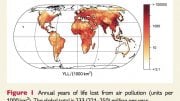
Exposure to ambient air pollution, such as car exhaust, has been linked to a higher risk of developing dementia; genetics can heighten the risk. Credit: IQAir
Research reveals a link between environmental air pollution and certain dementia characteristics, like impaired verbal fluency. Possession of a particular gene variant seems to amplify and complicate this risk.
An international study commissioned by the Lancet three years ago outlined 12 overall modifiable risks linked to dementia. It also identified a trio of newly recognized factors contributing to dementia risk, namely, excessive alcohol consumption, head injury, and air pollution.
A recent study published in the Journal of Alzheimer’s Disease, a research group spearheaded by scientists from the University of California San Diego, provided further insights into the role of air pollution – specifically ambient pollution stemming from sources such as vehicular exhaust and power plant emissions – in increasing the risk of dementia over the course of time. The study confirmed that exposure to this type of pollution is associated with a measurably greater risk of developing dementia over time.
Senior author William S. Kremen, Ph.D., professor of psychiatry and co-director of the Center for Behavior Genetics of Aging at UC San Diego School of Medicine, and colleagues examined baseline cognitive assessments of approximately 1,100 men participating in the ongoing Vietnam Era Twin Study of Aging. The average baseline age was 56, with 12 years of follow-up.
They additionally looked at measures of exposure to particular matter (PM2.5) in the air and nitrogen dioxide (NO2), which is created when fossil fuels are burned, and assessments of episodic memory, executive function, verbal fluency, brain processing speed, and APOE genotype.
APOE is a gene that provides instructions for making a protein crucial to the transport of cholesterol and other fats in the bloodstream. One version or allele of APOE called APOE-4 has been identified as a strong risk factor gene for Alzheimer’s disease.
The researchers found that participants with higher levels of exposure to PM2.5 and NO2 in their 40s and 50s displayed worse cognitive functioning in verbal fluency from age 56 to 68. And persons with the APOE-4 allele appeared even more sensitive, with those exposed to higher PM2.5 levels showing worse outcomes for executive function and those with higher NO2 exposure showing worse outcomes involving episodic memory.
Executive function refers to higher-level cognitive skills used to plan, control and coordinate mental behaviors and acts. Episodic memory is the ability to recall and re-experience distinct, specific past events.
“The 2020 Lancet report concluded that modifying 12 risk factors, which include others like education and depression at midlife, could reduce dementia incidence by as much as 40%,” said first author Carol E. Franz, Ph.D., professor of psychiatry and co-director of the Center for Behavior Genetics of Aging.
“That report placed ambient air pollution as a greater risk for Alzheimer’s and related dementias than diabetes, physical activity, hypertension, alcohol consumption, and obesity. Our findings underscore the importance of identifying modifiable risk factors as early in life as possible — and that the processes by which air pollution affects risk for later-life cognitive decline begin earlier than previous studies suggest.”
Reference: “Associations Between Ambient Air Pollution and Cognitive Abilities from Midlife to Early Old Age: Modification by APOE Genotype” by Carol E Franz, Daniel E Gustavson, Jeremy A Elman, Christine Fennema-Notestine, Donald J Hagler Jr, Aaron Baraff, Xin M Tu, Tsung-Chin Wu, Jaden De Anda, Asad Beck, Joel D Kaufman, Nathan Whitsel, Caleb E Finch, Jiu-Chiuan Chen, Michael J Lyons and William S Kremen, 2 May 2023, Journal of Alzheimer’s Disease.
DOI: 10.3233/jad-221054
The study was funded by the National Institute on Aging.









Be the first to comment on "The Invisible Enemy: Ambient Air Pollution Elevates Dementia Risk"